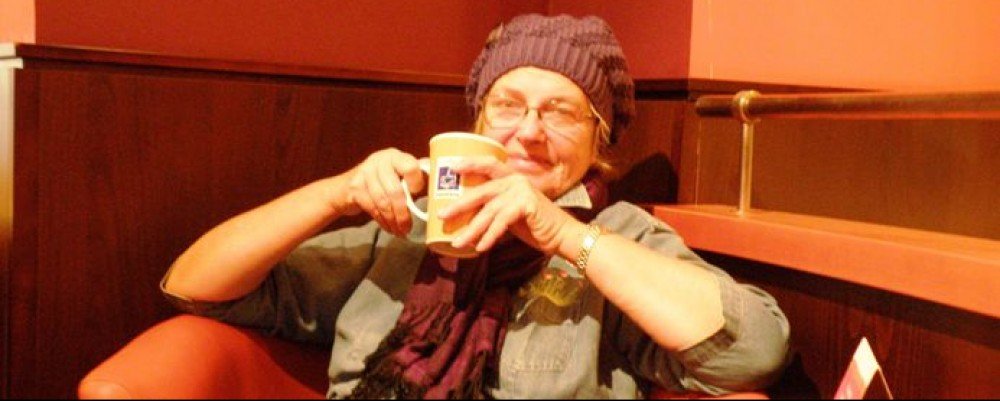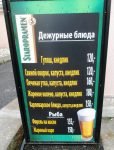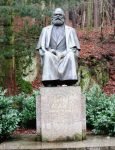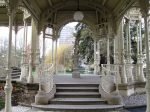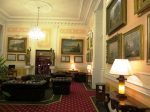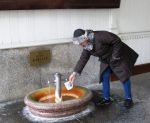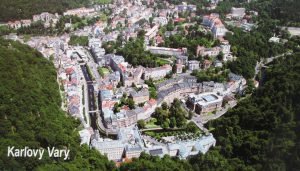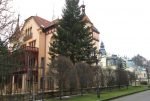The city of Karlovy Vary, better known by its English name Carlsbad, is very different from any other town in the Czech Republic. The most noticeable difference is that all the commercial signs are in big, bold Russian Cyrillic letters. Next is the strangeness of walking up Peter the Great Street you find a larger than life statue of Karl Marx across from the ornate Russian consulate. To understand this place we need a little history.
No doubt early cave men gathered here to enjoy the natural warm mineral springs. The first official records start in 1370 when Charles IV, who was also responsible for much of Prague’s glory, declared it a city. Over the following centuries its elegant spas became a fixture on the European tour of the royal and the wealthy of many nations including Tsar Peter the Great of Russia and Karl Marx of Germany. Many aristocrats built elaborate mansions for their periodic visits. When the railroad was completed in 1870 the number of annual visitors jumped three fold and construction of large hotels boomed.
But then the Great War (WW I) brought an end to leisurely spa treatments as well as to the city being part of the German speaking Austro-Hungarian Empire. The locals found themselves an unwilling part of the new country, Czechoslovakia. They then became pawns in the power struggle that led to WW II as the infamous Munich Agreement of 1938 gave the region back to Germany. After that war the German population was forcibly evicted, then the Communists inherited the area and in 1951 the large and elegant Grandhotel Pupp was renamed to Grandhotel Moscow.
In the 1980’s the Soviet Union disintegrated and Czechoslovakia obtained independence from communist rule. Yet since that time the number of Russians visiting, buying property and opening businesses in Karlovy Vary has steadily increased. So let’s fast forward to 2014 when the hotel has been renamed Pupp but whose clientele is predominately Russian.
Personally I like spas and love to soak in hot water whenever I can. Yet I had not yet visited Karlovy Vary because whenever I checked the hotel prices seemed too high plus I could not find any baths for drop-in; all the sites talked about “treatments”. This time, however, it was mid-January and mid-week so I found a spacious room in a converted apartment building that fit my budget. It was a long walk from the town centre but right in the middle of the spa and spring neighborhood. Hotel Heluan, if you want to check it out. The hotel manager confirmed my fears: you can’t take a mineral water bath without also signing up for a massage, irrigation, magneto therapy or the like.
But you can buy a unique souvenir: a specially designed cup for “taking the waters”, in which you stroll around elegant colonnades tasting water from various springs, officially 12 of them varying in composition and temperature. One is a geyser constantly shooting hot water several meters into the air. People like to stand near it and breathe in the mist.
Strolling along the streets between the springs one factor continually assaulted my eyeballs—money, money, money. The pavement may not be gold but some of the architecture is gilded with it. The shops are all full of high end antiques and glass ware or fashion boutiques; I can’t remember what all because I would never consider buying any of it. The other tourists are noticeably different than in Prague. I did see a few that had obviously Russian features and I assumed others were from there as well. The next day on Castle Hill above the spas I walked along streets lined with mansions—all fastidiously maintained; for rent and for sale signs all in Cyrillic, of course.
I have seen other Czech towns and neighborhoods suffer when money is no longer available for upkeep on the elaborate architecture, parks and public areas. Karlovy Vary is so consistently beautiful I hate to think what would happen if the moneyed Russians decided they were no longer welcome here. Some local town hall leaders are backing a new law to require a Czech language version of all signs and publicity and are asking the country’s secret service to investigate the possible presence of the Russian Mafia.
In conclusion, if you want to luxuriate in elegant spas, browse expensive shops, ogle elaborate architecture or sip free hot mineral water, visit Karlovy Vary, Czech Republic and learn the Russian language while you are at it.
P.S. However, the town will never loose its Czechness because it is the home of the national drink(non-beer), Becherovka.
Most photos by Karin
